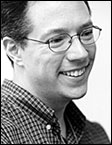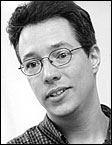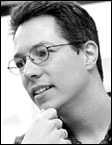This week, Catholic New World special contributor Hilary Anderson
talks with Bradley Danna-Mulick.
Lay pastoral associate
finds his faith, calling
Bradley Danna-Mulick calls himself a professional lay minister,
but his official title is pastoral associate at Chicago’s St.
Bruno parish.
He points out that anyone who serves the church is a lay minister—from
altar servers to lectors. “The only difference between us is that
I have a mandate from the cardinal to do this work at St. Bruno’s,”
said Danna-Mulick.
“Anyone who lives out his baptism in service to the church is
a lay minister.” He got his present position after completing
a master’s in divinity degree from Loyola University and doing
an internship at Chicago’s St. Clement Parish.
Danna-Mulick did not always have a calling to do church work.
He was baptized Catholic but grew up in a non-practicing household.
“The only time I went to church was when I visited my grandmother
but the Masses she took me to were in Polish so I was even more
confused,” he said.
“I didn’t have much information about the Catholic Church as a
youngster and saw a lot of hypocrisy in organized religion. I
had a scientific world-view belief system, ‘If you can’t see it,
it’s not there.’ I intentionally was an atheist.”
Catholic New World: What changed your way of thinking?
Bradley Danna-Mulick: I started considering a belief in God in high school after meeting
people whose faith seemed authentic. I wanted to know more. Then
I met a young woman in whom I had a romantic interest. She asked
me one day, “What are you?” My reply was Catholic by default.
I was baptized. She said, “I’m Catholic and it’s very important
to me.” So I went to church the first couple of times out of self-interest.
I began to hear and feel some things that made me want to investigate
this further. I heard the Scriptures and saw what was being done
on the altar. I had a window into something that was true but
with a capital “T,” true to the human spirit as opposed to something
that I could put on a scale and measure. From there it was a process
of overcoming misconceptions and letting go of naiveté—of only
believing what you can hold in your hand.
CNW: When did you first receive the sacraments?
BDM: I did my undergraduate work at the University of Illinois at
Chicago and went through the RCIA process at the Newman Center
there. I received the Eucharist for the first time when I was
21 at an Easter Vigil service and also was confirmed then.
CNW: What was your experience in the RCIA program?
BDM: There were people in RCIA who were asking questions, seeking answers.
It was an open feeling of inquiry, an exploration of the human
spirit, a very prayerful experience. There was a lot of fellowship
and support. In particular, there was a campus minister who was
important to me. She became a mentor and helped after the program
was over when I was considering ministering in the church. I now
am so invested in the RCIA process because of my personal experience
in it.
CNW: When did you decide to become a professional lay minister?
BDM: There was no letdown for me after the RCIA program ended. Some
people experience a “dip” from the excitement. I was leery of
jumping in and becoming a deacon or something so I waited, but
the feeling of being called to minister never disappeared. I originally
was preparing to teach high school English with a journalism focus.
Before becoming a Christian, I was looking for what it was that
I could do or give that would make a contribution to the world
and make me incredibly happy. I found a quotation that really
stuck with me, “The trick is to find the place where God’s greatest
need and your greatest joy intersect.” After talking with people
and praying about it, I felt that ministry, particularly parish
ministry, would do that. It would enable me to exercise the different
dimensions of my personality and skills in a way that would be
very life-giving while hopefully contributing to the people of
God.
CNW: Do you regret not growing up Catholic?
BDM: I once rued the fact I didn’t have the knowledge or experience
base of someone who grew up Catholic. I sometimes felt cheated.
I realize now I have a contribution to make based on my own experience
as a non-believer, someone who went through the RCIA process as
an adult. Because of my journey, I can offer a perspective other
people can’t. I have an understanding of the skepticism and questions
other people in my age bracket might ask, of how we appear to
people entering our church for the first time—those who might
be giving it a one-time shot.
CNW: What happened to the person in whom you had a romantic interest
in high school and who caused you to start going to church?
BDM: Her name is Kim. We married nine years ago and have a year old
son, Benjamin. Kim frequently helps out at St. Bruno’s.
Top









